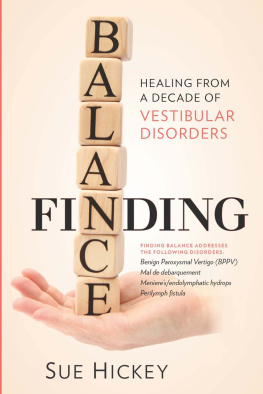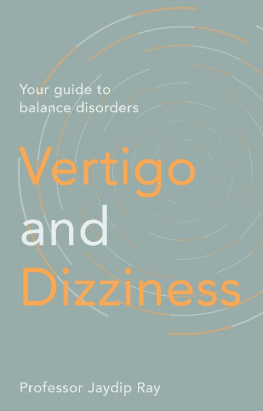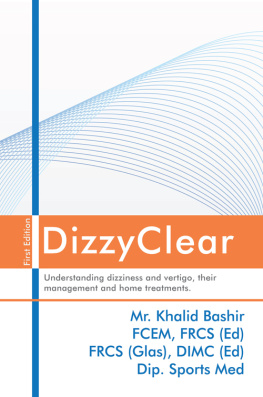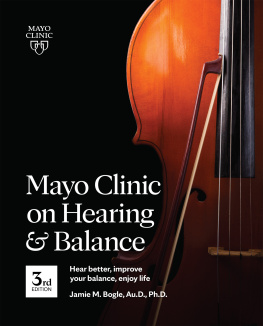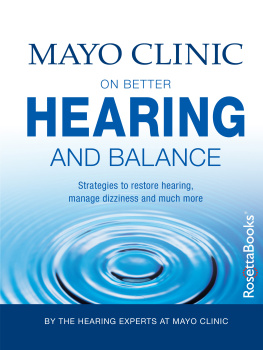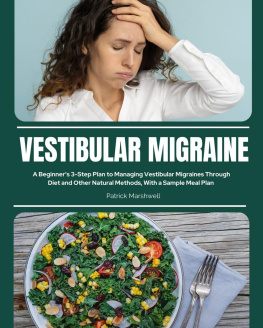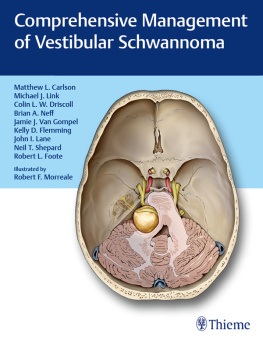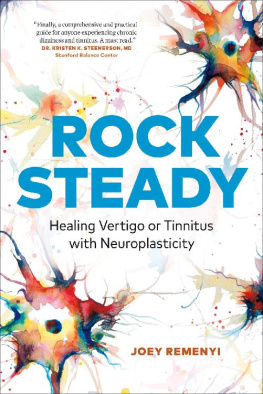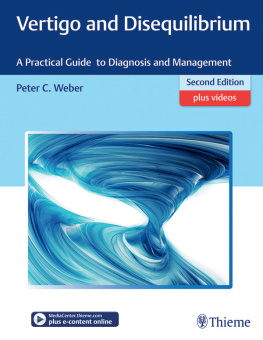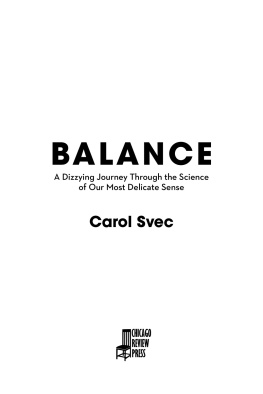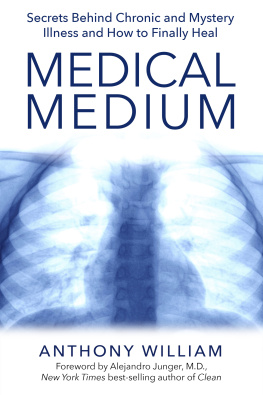Finding Balance
Finding Balance
Healing From a Decade of
Vestibular Disorders
Sue Hickey

New York
Contents
Dr. F. Owen Black
. Losing Balance
March 1996April 1996
. Denial: Is Anything Really Wrong With Me?
April 1996August 1996
. The Pendulum Swings Wildly
September 1996January 1997
. The Medical Fog Clears
January 1997May 1997
. The Surprise End of a Satisfying Career
June 1997October 1997
. A Clear Diagnosis at Last
November 1997December 1997
. Perilymph FistulasBed Rest
January 1998February 1998
. Perilymph FistulasNeighborhood Rest
March 1998May 1998
. Hydrops Holding Me Back
June 1998August 1998
. Vestibular Rehabilitation
August 1998October 1998
. Life Lessons
October 1998December 1998
. A Transitional Life
January 1999May 1999
. Taking Flight
May 1999July 1999
. Vacation Home
July 1999August 1999
. Managing My Recovery
September 1999October 1999
. Lifes Ups and Downs
November 1999December 1999
. Rotation Therapy
January 2000October 2000
. Testing Acceptance
November 2000September 2002
. A Genuine Breakthrough
October 2002October 2003
. A Giant Step Backward
January 2004December 2004
. Finding Balance
December 2004October 2006
If you listen carefully to the patient they will tell you the diagnosis.
William Osler
Sue Hickey is an extraordinary person by every measure. Students of vestibular disorders should study her chronicle of complex, multiple, inner ear vestibular disorders. Ms. Hickey has developed a systematic approach to manage vestibular disorders based upon seven distinct stages of her diagnosis, management and outcomes. While individual patients problems will vary in detail, her practical, systematic and logical approaches will likely help both patient and physician identify and manage one of the most difficult problems in medicine: vestibular disorders.
Among the many problems facing the vestibular patient and their physicians are: 1) no common language exists for reporting perceptions (symptoms) arising from vestibular disturbances, 2) information from the vestibular system is distributed rapidly and subconsciously to all body muscles; the primary distributions are to the eye muscles and to the muscles controlling body center-of-mass in the pelvis. Consequently the patient is limited to attempts to describe the effect(s) of abnormal commands to eye globe (experienced as visual disturbances) and body muscles (usually perceived as imbalance) arising from abnormal vestibular function.
Both patients and physicians are additionally hampered by an inadequate medical education system: vestibular disorders are minimally taught, if taught at all, in medical schools and even residencies. Coupled with a paucity of trained personnel is the limited availability of essential laboratory test facilities. When combined with the tendency to mis-diagnose vestibular disorders as primarily neurological or psychological disorders, the average vestibular patient is in deep trouble. A common example: attributing vestibular symptoms in head trauma patients to brain injury.
Ms. Hickeys book puts forth many important issues and problems that may or may not apply to each individual vestibular patient. However, she points out several principles that affect many patients:
1. There is an important difference between perception and performance from a patients viewpoint. Specifically, Ms. Hickey was accurate with respect to her perceptions, but tended to futilely push through in attempts to perform, often at great cost in ability to perform activities of daily living consistently.
2. Because of the need to severely restrict physical activity in order to heal perilymph fistulas, neuromuscular de-conditioning results. Ms. Hickey describes some strategies that should help patients deal with both the physical and psychological consequences (especially depression) of restricted physical activity.
3. One of the common medical dictums that must be overcome for patients with multiple vestibular disorders is that the patients symptoms can be attributed to a single abnormality (a single cause for the abnormal vestibular physiology or pathology). Ms. Hickey had objectively confirmed perilymph fistulas (PLFs), endolymphatic hydrops (ELH) and benign paroxysmal positional nystagmus and vertigo (BPPN & V), all arising at different times and all interacting at some epochs during her clinical course. Consequently, the patient and the physician must attack a series of moving targets. The goal is to determine the major cause of symptoms and attack the most prominent problem first. This task obviously is not simple. For example, PLF patients (especially if undiagnosed for long periods) can develop ELH as a complication. Patients with persistent ELH (including Mnires disease) develop BPPN. Ms. Hickeys careful logging of symptoms were very helpful in the process of sorting out which conditions were the major source of her symptoms.
More importantly, she presents some techniques and strategies that will help many, if not most, patients cope with vestibular disorders.
Dr. F. Owen Black
Agrawal, Y. (2009). Disorders of balance and vestibular function in US adults; Data from the National Health and Nutrition Examination Survey, 20012004. Archives of Internal Medicine, 169 (10), 938944.
My husband, Shelly, was instrumental in helping me learn to accept a new life with vestibular disorders. He was also a primary force supporting my writing and publishing this book, even lending his own insightful thoughts to the narrative. Without his support and assistance this book would not exist.
I am also indebted to Dr. F. Owen Black who provided over a decade of medical treatment for my vestibular disorders. He also volunteered his time to review several versions of the book to assure the medical aspects were correct and helpful to as wide a range of patients as possible. Dr. Bradley Coffey provided especially helpful review of the medical aspects of the book from his perspective of visual rehabilitation. My friend and chiropractor, Paul Hagen, also contributed his valuable perspective.
My vestibular friendsSuzanne, Nancy and Gilliewere especially helpful. Their review of the book confirmed that my story was also their story. Suzanne went even further and assisted me throughout the publication process.
Thank you to Ben who helped research and define the universe of patients, physicians and others in the vestibular community.
To everyone else who read early drafts and provided their feedback, I am very grateful. Without this confirmation that I had a valuable story to tell, I might have put my drafts in a box and filed them away.
THE BRAVE NEW WORLD OF VESTIBULAR REALITIES
In December 1997 I was diagnosed with vestibular problems, more commonly known as balance problems. Youve probably never heard of vestibular problems; until I had one, neither had I. There are more than ten million people in the United States with debilitating balance problems who may not be aware they have a vestibular disorder, because it is a stealth illness.
By stealth illness I mean that vestibular disorders are not widely known; they are not covered in the popular press. There are no medications you might have seen advertised on TV. Its difficult to know you have a vestibular disorder. Vestibular problems also are difficult for a doctor to diagnose, especially when more than one is present. They also are very difficult to fix.

